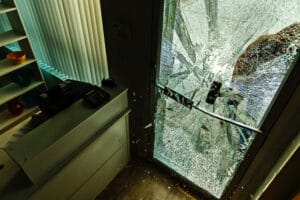When Can I Be Charged With Looting?
You’ve watched on the news as people break into stores across the country. A broken plate-glass window, and suddenly a mass of people are pouring into the Gap or Best Buy and taking whatever they can grab. This seems like looting. But what, specifically, is required for a conviction?
There Has To Be an Emergency To Be Charged With Looting
In California, a looting charge requires more than simply taking someone else’s property. Stealing can only be classified as looting when a state of emergency or local emergency is in effect. In California, a valid state of emergency can be declared by the Governor. In contrast, a local emergency can be invoked by a mayor, city council, county commissioner, or other local governmental body. A state or local emergency can be called for any of the following reasons:
- Earthquakes;
- Fires;
- Floods;
- Other severe weather causing extreme damage; or,
- Riots.
Once an emergency is declared, it only ends when the governmental official or body repeals the emergency declaration.
Burglary, Grand Theft, and Petty Theft Can Lead To Looting Charges
A charge of looting requires an underlying crime in California. During a state or local emergency, you can be convicted of looting if you commit:
- Second-degree burglary,
- Grand Theft; or,
- Petty Theft
Burglary is the crime of entering a structure with the intent to commit a felony such as theft. Only second-degree burglary can lead to a looting charge, and the difference is that the structure entered was not a place where someone lives. Entering a home or other dwelling intending to commit a felony is first-degree burglary, which is not looting but is a serious crime of its own.
The difference between grand and petty theft is in the dollar value of the merchandise stolen. To commit grand theft, you must take property worth more than $950, while petty theft is stealing items worth less than $950. To commit looting, you must commit burglary, grand theft, or petty theft during a state of emergency.
Looting Can Be a Felony or Misdemeanor
In California, a looting charge is a “wobbler,” meaning it can be either a felony or a misdemeanor. Looting by petty theft is always charged as a misdemeanor. For the other two versions of looting, the prosecutor typically has the power to charge looting how they see fit, based on:
- Your criminal history; and,
- All of the events surrounding your alleged actions.
The difference in penalties between misdemeanor and felony looting is vast. Felony looting can lead to up to three years in county jail, up to $10,000 in fines, and up to 240 hours of ordered community service. Unless a judge decides a jail sentence is not justifiable, anyone convicted of looting by burglary or grand theft serves a minimum of 180 days in county jail.
With the difference in possible jail time ranging from 180 days to three years, it is vital to have the best possible legal defense to a looting charge. In addition to affirmative defenses such as mistaken identity, lack of criminal intent, and illegal search and seizure, a skilled criminal defense attorney can argue it is not in the interests of justice to have you put in jail. If your judge believes putting you in jail is unjust, you may end up only having fines, probation, and community service.
If you have been charged with looting in Irvine, California during the recent states of emergency, contact the Chambers Law Firm at 714-760-4088 or dchambers@clfca.com to schedule a consultation.





